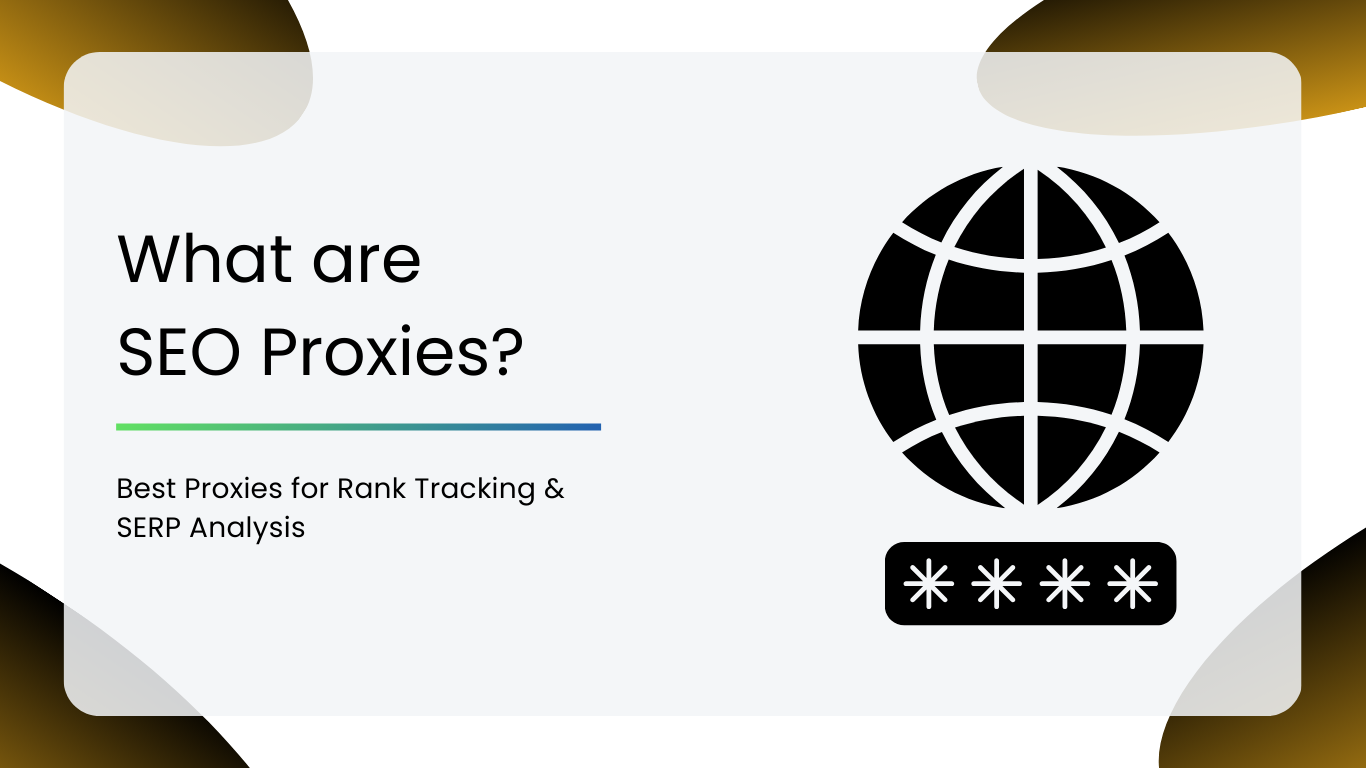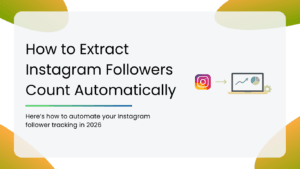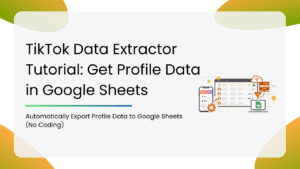If you’ve ever tried to track your website’s Google ranking across different locations or devices, you’ve probably run into some roadblocks like inconsistent results, blocked IPs, or search engines serving you personalized data that’s anything but neutral.
SEO proxies come into play here. They might sound a little technical, but proxies are actually one of the simplest tools you can use to get accurate, unbiased, and location-specific search results.
Using the right proxy can totally change the way you track keyword rankings and analyze search engine result pages (SERPs). In this article, we’ll break down what SEO proxies are, why they matter, and how to pick the best ones for rank tracking and SERP analysis.
What are SEO Proxies?
An SEO proxy is like a middleman between your device and the search engine. Instead of sending your request directly from your own IP address, a proxy sends it on your behalf using a different IP.
So, why does this matter?
Search engines like Google don’t really support it when the same IP keeps sending tons of automated queries. If you’re checking keyword rankings at scale, especially across different countries or cities, your IP can get rate-limited, blocked, or worse, you’ll start seeing results that are not what your real audience sees.
That’s where proxies come in. With the right SEO proxy setup, you can:
- Track rankings without getting blocked
- See location-based search results
- Bypass captcha roadblocks
- Avoid personalized search results skewed by your browsing history
Why Use SEO Proxies for SEO & Rank Tracking?
If you’re serious about SEO, using proxies is important. Here’s why:
1. Get Unbiased SERPs (No Personalization)
Google personalizes search results based on your location, browsing history, and even device type. This system is great for casual searches, but not so great when you’re trying to get clean, accurate SERP data.
With proxies, you see search results the way your audience sees them, without any filters or personalization. It’s just all the data that’s raw, against unbiased rankings.
2. Target Location-Specific Search Results
Trying to track how your keywords rank in London, New York, or Tokyo? A regular search won’t make it. SEO proxies let you simulate searches from specific geographic locations, so you get localized SERPs that reflect real-world search behaviors in your target market.
3. Avoid IP Bans & Request Throttling
If you run too many keyword queries from a single IP, you’ll hit a wall. Google might slow you down or block your IP altogether.
Proxies distribute your requests across multiple IP addresses, so you stay under the radar and keep your tracking smooth and uninterrupted.
4. Automate Large-Scale Rank Tracking
Do you manually check your rankings? That surely would take up most of your time. By routing your SEO checks through proxies, you can automate the entire process. Proxies let your tools gather fresh, accurate SERP data without triggering Google’s alarms or hitting rate limits.
5. Maintain Data Consistency Across Projects
When you’re working across multiple clients, campaigns, or regions, consistent data is everything. SEO proxies help ensure you’re pulling standardized, comparable SERP data, so your reports stay accurate and your insights stay sharp.
How SEO Proxies Tackle Location-Based SERPs
Ever searched for something on Google while traveling and noticed the results look completely different? That’s because Google tailors search results based on your IP location. This use case is great for users. However, it could be a challenge for marketers who need to see how their site ranks in different regions.
Now, proxies change the game here. Proxies simulate users from specific cities, states, or countries by routing your requests through local IP addresses. So instead of seeing results meant for your own location, you can see what a person in, say, Bangalore or Sydney would see when they search that same keyword.
Here’s a simple example workflow:
1. Choose a Proxy with a Location-Specific IP
Let’s say you want to track your keyword rankings in Mumbai, Delhi, and Bangalore. You’d select proxies that have IPs based in each of those cities.
2. Set Up Keyword Check By City
Set the keywords into your rank tracking tool, assigning the appropriate proxy for each city.
3. Run Your Rank Tracking Tool Through the Proxy
The tool sends queries as if they’re coming from within that city. Google then responds with localized search results.
4. Gather & Compare Results by Location
Once the tool pulls in the data, you can analyze how rankings vary across cities and adjust your SEO strategy accordingly.
The Case for Clean SERPs
Here’s something that most people don’t realize: no two Google searches are exactly the same.
Google personalizes your search results based on a few factors, like your Google account, search history, location, device type, and even what you clicked on last time. While this is super useful when you’re looking for the nearest coffee shop, it’s a total fail when you’re trying to do accurate SEO analysis.
This is because it means you’re not seeing what everyone else sees. Google might show your content higher just because you visit it often, not because it’s ranking well for others.
Now, when you use a proxy, especially one that’s unlinked to your personal browsing or account, it’s like hitting Google in a clean, neutral state. There are no cookies, no login history, and no device fingerprint. Just a raw, unfiltered view of what the SERPs actually look like for an anonymous user in a specific location.
Here, the result is more trustworthy ranking data. There are no artificial boosts, no ghost rankings, and just real-time results you can actually rely on.
Best Types of Proxies for SEO Tasks
Depending on what kind of SEO work you’re doing, the “best” type of proxy can vary. Here’s a breakdown of the most useful proxy types for SEO:
1. Static Proxies
These are proxies with fixed IP addresses, coming from datacenters. They’re great if you just need to check rankings in one region consistently.
Example: You run a local bakery in Chicago and want to track your keyword “best cupcakes in Chicago” every week. A static proxy with a Chicago IP helps you see consistent, location-relevant results without personalization messing things up.
2. Rotating Datacenter Proxies
If you’re doing high-volume scraping like pulling keyword rankings for thousands of keywords across multiple regions, you’ll want rotating proxies. These switch IPs automatically, helping you avoid bans and captchas. It is great for tools that need to stay undetected while sending lots of requests.
Example: An agency is running daily keyword tracking for 200+ clients across the U.S. Instead of overloading one IP and getting blocked, they use rotating datacenter proxies to automatically switch IPs while collecting thousands of data points.
3. Rotating Residential Proxies
These are the top standards when it comes to looking like a real human. They route your requests through actual devices connected to home networks. If you’re targeting hyper-local SEO or analyzing how competitors rank across cities, this is your bet for natural, unflagged access to SERPs.
Example: You want to analyze how your competitor ranks for “affordable sneakers” in New Delhi, London, and Tennessee. Residential proxies give you clean, location-accurate SERPs, as if you were searching from each city in person.
4. Un-personalized Search Tools
Just want to do a quick rank check without dealing with proxy setup? Certain online tools give you un-personalized searches with clean SERPs in seconds without any login permission or history access. It is perfect for people who don’t want deep automation yet.
Example: You’re a solo marketer preparing for a pitch and want to quickly check where a client ranks for “luxury skincare India” without any data bias. You can use any online tool’s un-personalized search, enter the keyword, and instantly get neutral results.
Comparison Table: SEO Data Gathering Methods
| Method | Pros | Cons |
| Manual Google Search | Free, easy to do, no setup required | Personalized results, location bias, time-consuming |
| Static Proxies | Consistent location, easy to use, stable IP | Not ideal for high volume, limited flexibility |
| Rotating Datacenter Proxies | Great for automation, high-volume scraping, cost-effective | Easier to detect, less geo-accurate |
| Rotating Residential Proxies | Highly accurate, mimics real users, great for geo-targeted analysis | Slower, more expensive, setup needed |
| Unpersonalized Search Tools | Fast, clean SERPs, no login/history interference | Limited customization, can’t automate or scale |
Best SEO Proxies
Looking for the right proxy provider to power your rank tracking and SERP monitoring? Whether you’re a solo SEO or an agency managing large-scale projects, here are some of the best proxy solutions tailored for SEO tasks:
1. Oxylabs
Oxylabs is one of the most trusted names in enterprise proxy services, known for its global reach and advanced scraping infrastructure. With 100M+ residential IPs and dedicated SERP APIs, it’s tailor-made for SEO professionals needing accurate, high-frequency rank tracking. You also get built-in rotation, real-time stats, and compliance features.
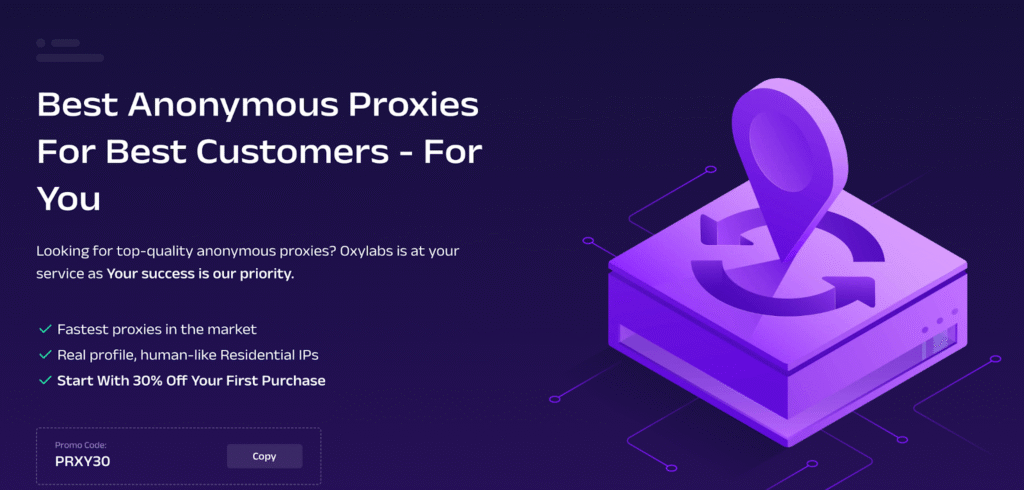
2. Decodo
Decodo brings in an industry leading SERP Scraping API which provides full stack scraping proxy solutions for Google and more. Users can audit websites, track localized content and monitor SERP results to enhance brand visibility easily online. Decodo also helps users stay ranked high in search and AI overviews, making it a top choice for SEO experts.
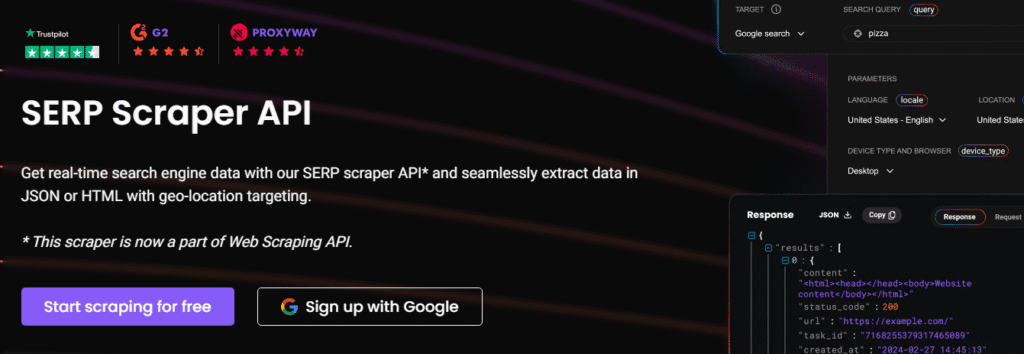
3. Webshare
Webshare is particularly well-suited for SEO professionals due to its comprehensive proxy solutions and features that directly address core requirements of optimizing search engine tasks. It’s specialization in reliability, global coverage, bypassing geo-blocks, developer tools and cost-effectiveness makes it an ideal choice.
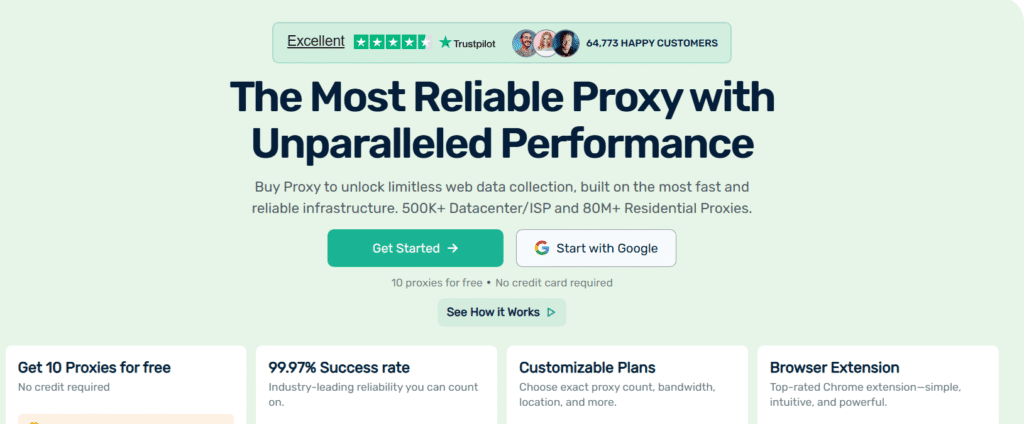
4. SOAX
SOAX offers clean, ethically sourced residential and mobile proxies with precise geo-targeting, making it a strong choice for marketers tracking localized SERPs. The dashboard is intuitive, with flexible filtering options by country, city, and even ASN. Their automatic IP rotation ensures minimal detection and smooth scraping. It’s ideal for users who want control, clarity, and consistency.
5. Infatica
Infatica’s proxy network is built for data-driven tasks like SEO monitoring, competitor research, and ad verification. Their residential proxies mimic real user behavior, which helps in bypassing anti-scraping systems and personalization filters. You also get access to real-time dashboards and usage analytics, which is a plus for agencies managing multiple campaigns.
6. Rayobyte
Rayobyte offers residential, datacenter, and ISP proxies backed by strong ethical sourcing and high uptime guarantees. Their residential proxies are especially effective for SERP scraping and rank tracking across locations. What sets them apart is their clear documentation, flexible pricing, and strong customer support. With Rayobyte, you’re not just buying IPs; you’re getting infrastructure-grade reliability.
7. NetNut
NetNut doesn’t rely on peer-to-peer networks. Instead, they route traffic through real ISPs, offering faster speeds and higher reliability. This makes them great for large-scale, real-time SEO tasks like SERP monitoring, backlink audits, and ad tracking. Their zero-hop architecture means you get stable, low-latency access to search engines without bottlenecks.
8. Bright Data
Bright Data is a premium proxy provider offering residential, datacenter, and mobile IPs with powerful tools like a SERP API, data unblocker, and traffic analyzer. Known for its transparency and compliance-first approach, Bright Data provides unmatched targeting precision and reliability. It’s built for users running complex SEO operations across multiple geographies.
9. IPRoyal
IPRoyal is a budget-friendly yet powerful proxy service offering residential, datacenter, and mobile proxies. Their ethically-sourced IP pool and flexible plans make them an ideal entry point for freelancers or small teams diving into SEO automation. Despite the low price, you still get solid performance and geo-targeting options for localized rank tracking. It’s a solid choice for those who want capability without complexity.
No matter your SEO goals, be it localized rank tracking, competitor monitoring, or full-scale SERP analysis, these proxy providers offer the speed, accuracy, and reliability you need to get the job done right. Choose the one that best fits your scale, budget, and workflow, and start making cleaner, smarter SEO decisions today.
SEO Proxy Workflow
So, how do you actually use SEO proxies in your day-to-day workflow? Here’s a step-by-step breakdown:
1. List Your Target Keywords
Start with a clear list of the keywords you want to track. Make sure you organize them by region or market if you’re focusing on local SEO. The more specific, the better.
2. Set Up Proxies by Location
Next, assign proxies based on where you want to simulate searches. For example, if you’re tracking “best yoga studies” in Mumbai, Berlin, and Vietnam, you’ll need proxies with IPs in those cities.
3. Schedule Daily/Weekly SERP Scraping
Use your preferred SEO tool to run automated rank checks at set intervals. With proxies in place, these queries go out clean without any personalization or location bias.
4. Analyze Location-Specific Differences
Once the data rolls in, dig into how rankings vary by region. Are you dominating in one city but slipping in another? Are local competitors outranking you? This is where the main work happens.
5. Adjust Content Strategies Accordingly
Finally, take action. Based on your findings, tweak your content, landing pages, or meta info to better target regional intent. SEO isn’t just about ranking, it’s about staying relevant where it matters.
SEO Proxy Best Practices
Proxies are powerful, but only if you use them right. To get the most accurate data, here are a few best practices to keep in mind:
1. Use Reputable Proxy Providers
Stick with providers that offer ethical sourcing, uptime guarantees, and good customer support. Cheap or shady proxies might save your money, but can lead to unreliable data, bans, or worse.
2. Rotate IPs to Avoid Bans
Google will track it when one IP hits them with hundreds of keyword queries. Make sure your proxy setup includes IP rotation to distribute the load and avoid detection.
3. Don’t Overscrape, Spread Requests Over Time
Going too fast can flag your activity as bot-like. If you’re tracking a large set of keywords, pace your requests or set up scraping throughout the day. Slow and steady takes you a long way.
4. Combine with Automation Tools
For serious workflows, pair your proxies with automation tools like SERP APIs, custom scripts, or SEO platforms. It saves time, reduces errors, and helps you scale your tracking without burning out your IPs.
5. Use Lightweight Tools for Quick Checks
Not every job needs the full setup. For quick, one-off rank checks or pitch research, use free, unpersonalized search tools which give you clean data without any configuration, done in seconds.
SEO proxies are for anyone who wants clean, accurate, and location-specific data. Whether you’re tracking a handful of keywords or running deep-dive SERP analysis across regions, proxies help you cut through personalization, avoid blocks, and stay ahead of the competition.
With the right setup, you can:
- Track rankings more accurately
- Uncover regional SEO gaps
- Automate your workflows
- Make smarter content decisions
From static IPS to residential proxies, there’s a proxy solution for every kind of marketer.
Like this topic? Check out our other proxy-related blogs:
- Best Proxy Manager Platforms in 2025
- Best Free Proxy Checkers Online
- Top Mobile Proxy Service Providers in 2025: The Best Mobile Proxies for Speed, Security, and Anonymity
- Best Web Scraping Proxies in 2025
FAQs
Most major SEO platforms like SEMrush and Ahrefs already use their own internal proxy networks. But if you’re using custom-built scrapers, you can usually configure proxies with just a few lines of code or through a tool’s settings panel.
Free proxies might sound tempting, but they’re usually unreliable, slow, and often blacklisted by Google. They’re fine for quick tests or educational purposes, but not ideal for serious SEO work.
Paid proxies offer better uptime, speed, IP rotation, and customer support. They also come with guarantees around location targeting and performance, which makes them a safer choice for rank tracking at scale.
Yes. Always stick to ethical scraping practices:
– Spread out requests
– Use rotating proxies
– Respect robots.txt and tool TOS
– Avoid scraping sensitive or restricted data
When in doubt, use tools or APIs that are designed for large-scale data collection and follow platform guidelines.
Scaling is all about automation and rotation. You’ll want a combination of:
– Rotating residential or datacenter proxies (depending on your geo-targeting needs)
– A solid rank tracking tool or custom script that supports proxy rotation
– Smart scheduling (e.g., run tracking in batches or off-peak hours)
– Storage and analysis tools (like Google Sheets, BigQuery, or SEO dashboards) to organize your data
As your list grows, automation becomes key. So make sure your setup can handle retries, timeouts, and location switching smoothly.
Disclosure – This post contains some sponsored links and some affiliate links, and we may earn a commission when you click on the links at no additional cost to you.

